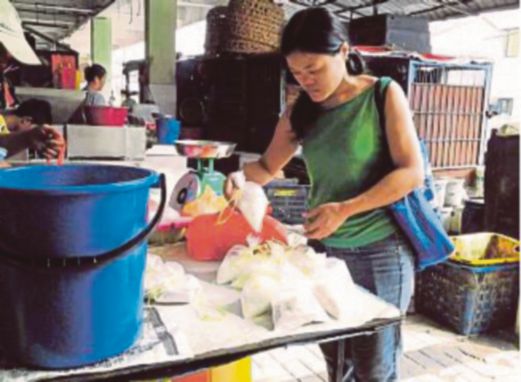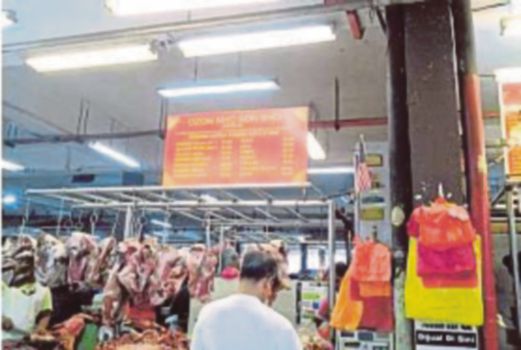SHOPPERS have the assurance that even as Hari Raya nears, traders, especially those at the wet markets, will be keeping their prices within the ceiling set by the Domestic Trade, Cooperatives and Consumerism Ministry.
Under the Aidilfitri Price Control Scheme 2014, effective from July 20 to Aug 5, the prices of 18 items will be controlled. Among the items listed under the scheme are live chicken, standard chicken, super chicken, local beef, imported beef (ceiling price in Sarawak only), imported buffalo meat (India), chicken eggs (grade A, B and C), red chilli, and tomato.
Also included are whole coconut (ceiling price at wholesale level only), grated coconut (ceiling price at retail level only), shallot (India), imported onion, garlic (China), imported potato (China) and mackerel.
Prime Minister Datuk Seri Najib Razak had on July 1 urged all traders in the country to sell the 18 items below the ceiling price.
Traders were also instructed to use pink price tags to identify them as price-controlled items.
A Streets check at a few markets found the traders saying they would stick to the ceiling prices despite the difficulties of compliance.
Zulkarnain Shah Bhari, 42, a butcher at the PJ Old Town wet market (also known as Pasar Besar Jalan Othman) said the ministry should take into account the price traders had to pay the wholesalers.
"Our cost is high but we can't mark up our prices too much because we want our customers to come back.
"At the same time, we can't fix too low a price as that would anger the other traders," said the butcher of 30 years.
Zulkarnain is selling fresh beef at RM24 per kg but he will be increasing the price to the ceiling price of RM26 per kg.
"The ministry has also simply marked one ceiling price for beef without considering that there are various types of beef, like frozen beef, minced beef, sliced beef and ground beef, which are alll sold at different prices."
And then there are the different parts of the cow, such as the tail, ribs, spleen, lung and stomach, which are in high demand during Hari Raya, he said.
"That's why we can't have just one ceiling price for beef, but not all consumers understand that."
Zulkarnain also felt that it was unfair of the ministry officers to merely take notes and photographs without talking to the traders when making their rounds at the wet markets.
"They need to understand the little things that we go through daily in this business," he said.
Despite his pricing dilemma, however, Zulkarnain is not worried about a shortage of beef supply for the festive season.
Coconut seller Saharuddin Bakri will not be raising his prices during Hari Raya. In fact, he will be selling his items at below the ceiling price.
"I have enough stock so there is no reason for me to hike up the price.
"The ceiling price for grated coconut is RM6 per kg, and I am selling it at RM5.50," he said.
Whole coconut, meanwhile, is sold according to size. One can cost up to RM3.
Some chicken traders, however, said they were facing a shortage of supply due to the hot weather.
Jenny Lim, 65, who sells local chicken, said the heat was resulting in unhealthy-looking chickens.
"This year has been a challenge as I have come across very few chickens that are fresh looking. Despite the short supply, I am keeping my prices affordable because I want to keep my loyal customers.
"The ceiling price for chicken is RM8 per kg, but I sell at RM7.50 per kg," said Lim, who has sold poultry for 50 years.
At the Datuk Keramat wet market, most traders acknowledged sufficient supply of controlled items and were enjoying brisk pre-Raya business.
However, many traders at the wet items section had failed to place price tags on their goods, prompting shoppers to ask for the prices and then bargain.
A trader who wished to be known as Mohamad said he was selling his chicken at the RM8 per kg ceiling price.
"So far I have enough supply. I'm aware of the price control scheme and I will adhere to it," he said.






